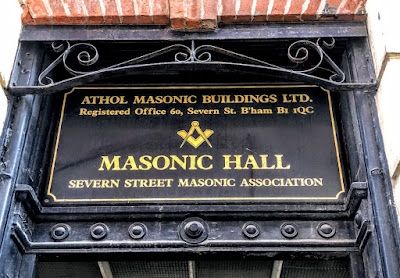The former Severn Street Synagogue at 60 Severn Street … in use from 1809 to 1856 (Photograph: Patrick Comerford, 2023)
Patrick Comerford
During my recent self-guided walking tour of Jewish Birmingham, I realised that the surviving Jewish heritage of Birmingham is largely Victorian.
The finest example of this Victorian heritage is Singers Hill Synagogue, now Birmingham’s main synagogue, which was founded in 1856. Its predecessor around the corner is the former Severn Street Synagogue at 60 Severn Street.
There was a small synagogue from at least 1780 to about 1791 in the area in Birmingham then known as the Froggery, a low lying swampy area replaced in 1845 by Station Road and New Street Station.
A new synagogue was built, in Hurst Street, in the vicinity of the Froggery, and was in use from ca 1791 to 1809. It was succeeded by the Severn Street Synagogue at 60 Severn Street.
Severn Street was newly carved out of the former Gooch Estate when that earlier synagogue was founded in 1809. The foundation stone of that synagogue was laid on 29 May 1809 and the building was completed in 1813.
Shortly after the synagogue was completed, however, it was wrecked and pillaged in riots against ‘dissenting houses of worship.’ The rioters also severely damaged the Methodist Church in Belmont Row, the Quaker Meetinghouse near Lady Well, and the Baptist Chapel in Bond Street.’
The synagogue was largely rebuilt and subsequently enlarged in Greek Revival style by the architect Richard Tutin (1796-1832) in 1823-1827.
Severn Street Synagogue was refurbished in 1851. By then, there were 780 Jews living in Birmingham, of whom about a quarter were recent arrivals from Poland and Russia. They were active mainly in four areas of economic life: glaziers, slipper makers, tailors and traders.
A schism developed in the community in 1852, leading to the formation in 1853 of the rival Wrottesley Street Synagogue. However, unity was restored in 1855, and the two congregations were reunited with the opening of the synagogue in Singers Hill in 1856.
The Freemasons have retained the Aron haKodesh or Torah Ark, with slight modifications, from the former Severn Street Synagogue
After Singers Hill Synagogue was built, the Severn Street Synagogue was sold to the Freemasons in 1856 and became the Athol Masonic Hall.
The Freemasons have retained the Aron haKodesh or Torah Ark, with some slight modifications. Its handsome, fluted Doric columns and classical entablature remain. The Master’s Chair is placed in the former Torah Ark niche.
The adjacent banqueting hall, decorated with Stars of David, was added for the Freemasons by the architect Henry Naden in 1871-1872.
The building has been a Grade II Listed since 2006.
Shabbat Shalom
The Severn Street Synagogue was sold to the Freemasons in 1856 and became the Athol Masonic Hall (Photograph: Patrick Comerford, 2023)




No comments:
Post a Comment